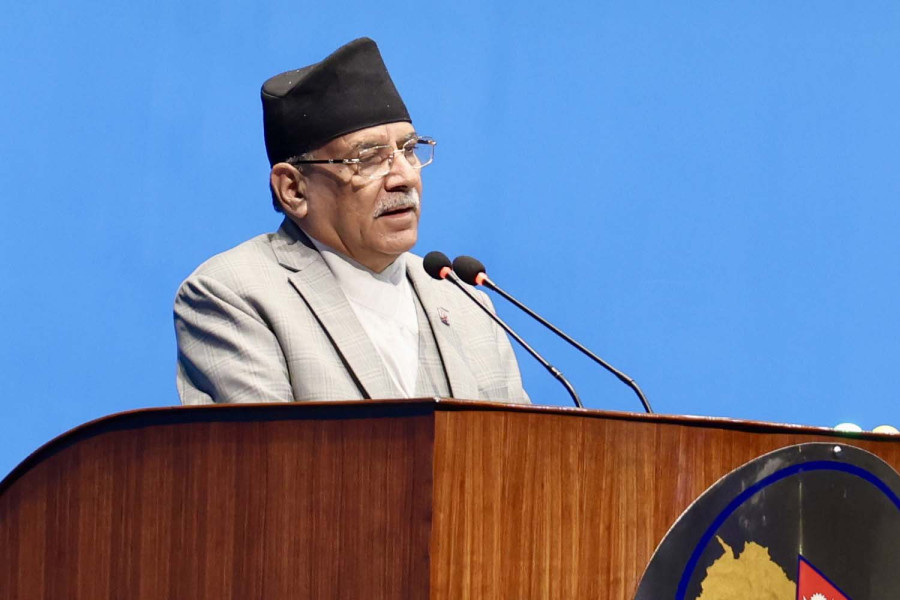Politics
Dahal challenges Prime Minister Oli over electricity tariff arrears
Maoist leader says his party will support Prime Minister Oli if the latter decides to collect electricity tariff arrears amounting to almost Rs22 billion through the Cabinet.
Post Report
As the dispute between the government and Kulman Ghising, the executive director of Nepal Electricity Authority (NEA) lingers, CPN (Maoist Centre) Chairman and former prime minister Pushpa Kamal Dahal has backed Ghising.
When six of the industries failed to pay the tariff for using the specialised feeder and trunk line to obtain electricity, the NEA had last month cut off the power supply of those industries. For days, despite the written order of the Electricity Regulatory Commission and the verbal orders of Prime Minister Oli, NEA chief Ghising had refused to restore power to six industries.
NEA later supplied the electricity to the industries but by then relations between Prime Minister Oli and Ghising had soured.
NEA also cut off the power to some industries in January this year. NEA resumed supply to the industries following the government’s recommendation.
Dahal, also the leader of the main opposition in the House of Representatives, addressing the House on Tuesday said that his party would support Prime Minister Oli if the latter decides to collect the electricity tariff arrears amounting to almost Rs22 billion from the Cabinet.
The industrialists owe roughly Rs8.25 billion—Rs 6.65 billion plus a 25 percent fine—according to the NEA. Industrialists who used the exclusive feeder and trunk lines for energy were first estimated by the NEA to owe almost Rs22 billion. But the arrears were adjusted when the government-appointed commission's advice was taken into account in order to resolve the disagreement.
The commission of inquiry tasked with resolving the tariff dispute of dedicated and trunk lines submitted its report to the Dahal government on May 6. Commission chair Girish Chandra Lal, a former Supreme Court justice, had submitted its report to Energy, Water Resources and Irrigation Minister Shakti Bahadur Basnet. The commission was formed on January 9.
Based on the commission’s report, the Dahal government decided to adjust the outstanding amount and collect Rs6.65 billion and 25 percent fine to it. However, speaking in Parliament on Tuesday, Dahal challenged the Oli government to go against his government’s decision.
“The NEA has so far issued bills of almost Rs22 billion. Let the upcoming Cabinet make a decision to recover this,” Dahal said.
The regulation related to the NEA’s billing has no provision to discount the amount, despite the commission’s recommendation, says NEA spokesperson Chandan Kumar Ghosh.
“But when the government also gave a similar kind of order, NEA, an organ of the government, had no other choice than to obey the order,” Ghosh told the Post.
As the NEA pressures the industries to clear their earlier dues and some have paid their bills, many say they will not do so until they receive the time of day (TOD) meter data from the NEA.
In response, the NEA earlier this month provided the parliamentary Public Account Committee (PAC) with an extensive record of the energy supplied to the industries through dedicated feeders and trunk lines, including the TOD metre data.
A tough debate over the electricity tariff also occurred recently in the Public Account Committee between the lawmakers of the CPN-UML and the Maoist Centre.
The parliamentary committee received over 100,000 papers from the state-owned electricity provider detailing logbooks, invoicing in Ampere, data from TOD metres, and specifics of bills given to industries.
Since the row between the government and the NEA, Prime Minister Oli and NEA head Ghising are giving statements against each other.
Defending Ghising, Maoist Centre Chairman Dahal accused Prime Minister Oli of being responsible for the failure to raise the electricity tariff.
“The prime minister has asked via Facebook why almost Rs22 billion in tariffs was not collected for nine years,” Dahal said. “The person who is supposed to give an answer should not have asked the question.”
Dahal also accused Prime Minister Oli of not letting NEA do its job.
On May 14, 2018, the study committee formed by the NEA on the issue of trunk line and dedicated line came up with a report that 61 industrial houses used electricity from the dedicated trunk line but did not pay the tariff, and the NEA had started charging them accordingly, Dahal said in the House meeting.
“At that time, Oli had ordered power supply to the industries be cut off,” Dahal accused. “Even some connections to factories were cut off to raise money, but later, with direct orders from Oli, they were restored.”
Ghising was appointed the executive director of the power utility during Dahal’s prime ministership in 2016. Later, he was dismissed from the position during Oli’s tenure in 2021. However, the subsequent government led by Nepali Congress President Sher Bahadur Deuba reappointed Ghising as the NEA head the same year.
A decade ago, when there was severe load-shedding, the whole country faced power cuts for hours. It was during Ghising’s first tenure that the outages ended. The Maoist Centre has been capatilising on the success ever since.
Maoist leaders often say that load-shedding had ended when their party led the government.
When the dispute between the government and the NEA leadership continued, Oli, in the questions-answer session of Parliament on August 23, said that the dues for power delivered via specialised feeders and trunk lines to the industries would be recovered.
Money will be collected but not by cutting off power supply, Oli said.




 14.12°C Kathmandu
14.12°C Kathmandu













